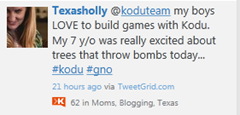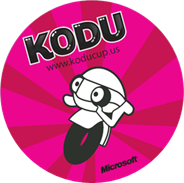Exploring children’s creativity with technology during girls’ night out
Last week a lively group of mothers met online for an event called “Girls’ Night Out” (#GNO). #GNO is a two hour virtual party hosted on Twitter by online parenting influential Mom It Forward (@MomItForward). This week’s theme was “Children’s problem-solving skills and creativity through the use of technology.”
The conversational online social event included participation by Jyl Johnson Pattee of Mom it Forward, Lili Cheng of Microsoft's Future Social Experiences (FUSE) Labs, and Becky Herr-Stephenson, research fellow, Joan Ganz Cooney Center at Sesame Workshop. During the two hour event, there was a lot of stimulating 140 character based discussion.
Here is a summarized flow of the conversation with a little narrative from us @msftcitizenship.
Question 1: What are tips for helping kids learn, love, and get interested in science, technology, engineering, and math (STEM)?
@RobynsWorld Play with them, do science experiments together, use tech together, show math in everyday life.
@seeryusmama Start the learning early and engage, engage, engage.
Our own @lilich added Tips 4 helping kids learn: bring the learning to where kids are- design, creativity, gaming.
Other tips included:
- Always make a game out of something new.
- Find something that engages kids & involves active learning.
- Help them find the answers, or the start of answers, of their natural curiosity.
- Playing games and programs online help too.
Question 2: How are STEM subjects different in school now vs. when you were in school? What takeaways can you apply at home?
@beccasara we had no STEM when I was in elem. school - now it's all we talk about.
@jylMomIF My kids learn practical application 4 all STEM subjs. For me, it was all about rote memorization/no practical application.
Other thoughts included:
- Parents are more hands on now.
- We truly value the time spent with kids and want to be involved in their learning.
- I totally learned how to type with a typewriter in high school!
- We still used the huge floppy disks when I was in school and I'm not even that old. LOL
Question 3: “What resources are available to help kids with STEM homework? How do you help your kids with this homework?”
@beccasara “Our school is starting to require students to have computers. They have problems to help. So cool!”
@c2cmom “Having a Kodu Club at schools would be great!”
@lucrecerbraxton added “we make it fun by playing games so the learning is not so stressful”
Question 4: Do you play video games with your kids? What types of educational video games do your kids play?
 Answers here were plentiful and ranged from “I play PC games with my kids” to “typing games” to “No games”. One of our favorite answers was as follows:
Answers here were plentiful and ranged from “I play PC games with my kids” to “typing games” to “No games”. One of our favorite answers was as follows:
@RobynsWorld “Yes we all play video games together. Most games can be educational in some way; Play video games yourself and figure out what skills it builds, logic, math, sequencing, etc.”
Question 5: Tips for moderating time spent gaming? What is an appropriate amount of time for kids to spend gaming?
@ladyozmaladyozma “I have a basket that handhelds go into during school hours/at night. We also have daily requirements of things”
Others thought to mix technology time up with creative play so the kids get a good mix.
Editor’s Note: Microsoft has done a lot of work in this area with an initiative called: Get Game Smart. The Get Game Smart program is designed to help families enjoy video games and online media in ways that are safer, healthier and more balanced. Visit https://www.getgamesmart.com for useful guides, advice and tools.
Question 6: Do you feel technology changes or enhances social opportunity or relationships? What about education? Why and why not?
The consensus here was that technology has had a very positive influence on education. Furthermore, like everything in life, there are both pluses and minuses to technology and therefore finding a balance is key.
@MomItForward offered “Tech also offers soooo many opportunities. We had a Twitter party 2 yrs ago w/women in a remote village in Kenya. SO COOL!!!”
@koduteam added “In 10 years we hope to have insanely great advances in the use of tech for learning- for kids, teachers, parents”
Question 7: How are you managing parenting in the digital age? How are you dealing with constant connectedness to technology with your children?
The answer to this question seemed to be a hard one to pinpoint as one participant pointed out “Sometimes u have 2 learn as you go along” and another offered “these questions assume I am managing. Got to make sure we take a break now and then and no tech at meals”
Other answers included:
- Limiting the hours per day electronics are on in the household.
- Monitoring their social accounts to make sure discussions are appropriate
- Parents control passwords
Question 8: When asked “what do you want to be when you grow up” how do your kids answer? What did you want to be?
The answers here were fun, familiar for many and some surprising as follows:
- Dump Girl (Garbage woman)
- Writer
- Nurse
- Vet
- Video game beta tester
@koduteam jumped in to share “for all those w/kids that want to be game designers or story tellers let us know if https://koducup.us competition helps!”
Question 9: How do you help your kids achieve their career goals? How do you embrace their interests?
There were a wide variety of answers which included:
- Build a love of books and reading
- Encourage kids to explore
- Talk to your kids
- Spend time with your kids
- Listen to your kids
- Spend time with kids – with them in person not just by location!
Question 10: How does STEM play a role in kid’s education? How has it changed over the years?
One tweeter quickly responds: “Not enough char in 12 tweets to cover that! LOL”
Our challenge to you, think about this question and let us know your opinion by commenting in the blog, writing on our facebook wall, or tweeting @msftcitizenship.
Thank you to Mom It Forward, Jyl Johnson Pattee, Lili Cheng, Becky Herr-Stephenson, Joan Ganz and all of the enthusiastic participants; without your thoughts, opinions, and actions STEM would not see the progress it has to date!
Supporting this Tweet up is part of our efforts to make people aware of the newly released Kodu Game Lab. A free, fun tool that enables kids from the age of six upwards to design and build exciting video games – while helping them to develop real-world skills by encouraging them to analyze a problem and develop a solution.
We’ve also launched the U.S. Kodu Cup, a nationwide competition giving 9-17 year olds the opportunity to build their own video games and compete for great prizes.



